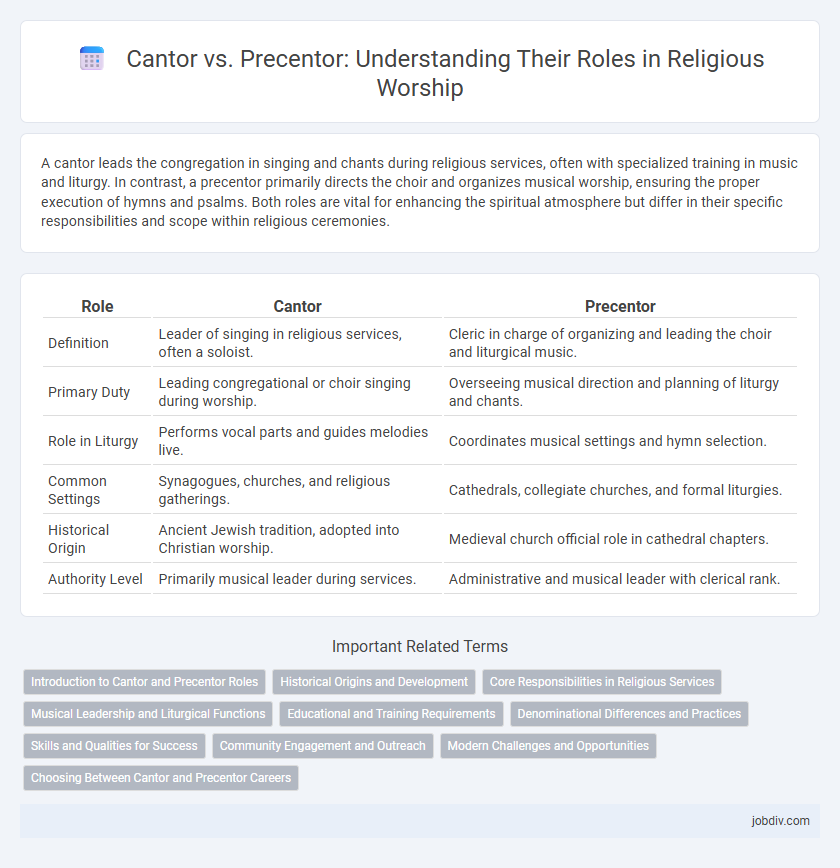A cantor leads the congregation in singing and chants during religious services, often with specialized training in music and liturgy. In contrast, a precentor primarily directs the choir and organizes musical worship, ensuring the proper execution of hymns and psalms. Both roles are vital for enhancing the spiritual atmosphere but differ in their specific responsibilities and scope within religious ceremonies.
Table of Comparison
| Role | Cantor | Precentor |
|---|---|---|
| Definition | Leader of singing in religious services, often a soloist. | Cleric in charge of organizing and leading the choir and liturgical music. |
| Primary Duty | Leading congregational or choir singing during worship. | Overseeing musical direction and planning of liturgy and chants. |
| Role in Liturgy | Performs vocal parts and guides melodies live. | Coordinates musical settings and hymn selection. |
| Common Settings | Synagogues, churches, and religious gatherings. | Cathedrals, collegiate churches, and formal liturgies. |
| Historical Origin | Ancient Jewish tradition, adopted into Christian worship. | Medieval church official role in cathedral chapters. |
| Authority Level | Primarily musical leader during services. | Administrative and musical leader with clerical rank. |
Introduction to Cantor and Precentor Roles
The Cantor leads the congregation in singing and is responsible for the musical elements of worship, often trained in vocal performance and liturgical music. The Precentor directs the choir and organizes the order of service, ensuring smooth coordination of liturgical practices and hymnody. Both roles are integral to enriching the spiritual experience through structured and harmonious worship settings.
Historical Origins and Development
Cantors and precentors both originated as leaders of congregational singing in religious rites, with cantors tracing back to early Jewish synagogue worship where they chanted Psalms, evolving in Christian liturgy into ordained ministers responsible for musical leadership. Precentors emerged primarily in medieval Christian monastic and cathedral settings, guiding choir and clergy in the correct execution of chant and liturgical songs, often holding an official ecclesiastical office. Over time, the cantor became more associated with solo vocal leadership and formal musical training, while the precentor's role expanded to administrative oversight of worship music and choir direction within the church hierarchy.
Core Responsibilities in Religious Services
A cantor leads the congregation in singing prayers, chants, and hymns, often serving as the primary vocalist during religious services. The precentor oversees the organization and coordination of the musical elements, ensuring liturgical accuracy and managing the choir or musicians. Both roles are essential for maintaining the spiritual atmosphere and enhancing worship through music, but the cantor focuses on vocal leadership while the precentor handles administrative and musical direction.
Musical Leadership and Liturgical Functions
Cantors lead congregational singing and chant with a focus on melodic precision and vocal leadership, often guiding psalms and hymns within worship settings. Precentors hold a broader liturgical role, overseeing the structure and flow of worship services, ensuring the integration of musical elements with ritual actions and prayers. Both roles emphasize musical leadership, but cantors primarily direct singing, while precentors coordinate the overall musical and liturgical experience.
Educational and Training Requirements
Cantors typically require formal theological education and specialized vocal training to lead congregational singing and chant proficiently, often obtaining degrees in sacred music or liturgy. Precentors must also have substantial musical training, with a strong emphasis on choir direction and liturgical knowledge, often receiving education through seminaries or religious institutions. Both roles demand ongoing practice in liturgical traditions, music theory, and sometimes language skills pertinent to specific religious rites.
Denominational Differences and Practices
Cantors in Orthodox Judaism lead choral prayers and possess deep knowledge of liturgical melodies, whereas precentors in Protestant churches guide congregational singing often without formal musical training. Denominational differences shape the roles: Catholic precentors typically organize chant and hymnody within the liturgy, emphasizing Gregorian chant, while Anglican precentors coordinate worship services and may also direct choir performances. These variations reflect distinctive theological emphases and liturgical traditions influencing how each role supports communal worship.
Skills and Qualities for Success
Cantors require strong vocal abilities, deep knowledge of liturgical music, and the skill to lead congregational singing with emotional resonance. Precentors must demonstrate exceptional leadership, organizational skills, and the ability to coordinate choirs and worship services effectively. Both roles demand a profound understanding of religious traditions and the capacity to inspire spiritual engagement through music.
Community Engagement and Outreach
Cantors lead congregational singing and enhance community worship experiences, fostering spiritual unity through music. Precentors coordinate liturgical practices and organize outreach programs, strengthening connections between the church and broader community. Both roles are pivotal in promoting active participation and engagement in religious and social activities.
Modern Challenges and Opportunities
Cantors and precentors face modern challenges such as integrating technology in worship and engaging diverse congregations while preserving traditional musical and liturgical roles. Opportunities include utilizing digital platforms to expand participation and foster community through virtual choirs and online hymnody resources. Balancing historical practices with contemporary expressions enhances worship relevance and accessibility.
Choosing Between Cantor and Precentor Careers
Choosing between a cantor and precentor career involves evaluating distinctive roles in religious music leadership, where a cantor primarily leads liturgical chanting and prayer, while a precentor oversees the overall direction of worship music and choir coordination. Understanding the specific denominational traditions and community needs can guide candidates toward a role that aligns with their vocal skills, theological knowledge, and leadership abilities. Career decisions should also consider opportunities for spiritual influence, public engagement, and the scope of musical responsibilities within the religious institution.
Cantor vs Precentor Infographic

 jobdiv.com
jobdiv.com